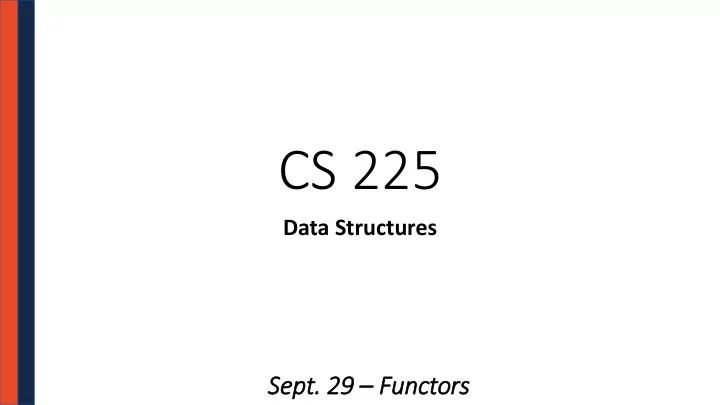

CS 225 Data Structures Sept. 29 – Functors
It Iterators Iterators give client code access to traverse the data! Ø 8 2 5 Operators: Types of iterators: operator++ Forward operator== Backward operator!= Bidirectional operator= operator*
QueueIter.h #ifndef QUEUE_H 1 Where does the iterator go? 2 #define QUEUE_H 3 4 template <class QE> 5 class Queue { 6 public: What additional functions are needed for an iterator? 7 8 9 10 11 12 13 14 15 16 private: 17 18 19 20 }; 21 22 #endif
stlList.cpp #include <list> 1 2 #include <string> 3 #include <iostream> 4 5 struct Animal { 6 std::string name, food; 7 bool big; 8 Animal(std::string name = "blob", std::string food = "you", bool big = true) : 9 name(name), food(food), big(big) { /* none */ } 10 } 11 12 int main() { 13 Animal g("giraffe", "leaves", true), p("penguin", "fish", false), b("bear"); 14 std::list<Animal> zoo; 15 16 zoo.push_back(g); 17 zoo.push_back(p); // std ::list’s insertAtEnd 18 zoo.push_back(b); 19 20 for ( std::list<Animal>::iterator it = zoo.begin(); it != zoo.end(); it++ ) { 21 std::cout << (*it).name << " " << (*it).food << std::endl; 22 } 23 24 return 0; 25 }
Queue.h 4 template <class QE> 5 class Queue { 6 public: 7 class QueueIterator : public std::iterator<std::bidirectional_iterator_tag, T> { 8 public: 9 QueueIterator(unsigned index); 10 QueueIterator& operator++(); 11 bool operator==(const QueueIterator &other); 12 bool operator!=(const QueueIterator &other); 13 QE& operator*(); 14 QE* operator->(); 15 private: 16 17 } 18 19 20 21 22 private: 23 T* arr_; unsigned capacity_, count_, entry_, exit_; 24 25 26 };
Function Objects (aka “ Functors ”) Functors are objects that can be called like a function. 1 2 3 4
Doubler.h #ifndef DOUBLER_H 1 2 #define DOUBLER_H 3 4 class Doubler { 5 public: 6 int operator()(int value); 7 }; 8 #include "Doubler.h" 1 9 #endif 2 3 int Doubler::operator()(int value) { 4 return value * 2; 5 }
1 template<class Value, class Modifier> 2 Value modify(Value value, Modifier modifier) { 3 return modifier(value); 4 } 11 Doubler d; 12 Tripler t; 13 int value = 4; 14 modify<int, Doubler>(value, d); 15 modify<int, Tripler>(value, t);
1 template<class Iter, class Formatter> 2 void print(Iter first, Iter second, Formatter printer) { 3 while ( first != second ) { 4 printer( *first ); 5 first++; 6 } 7 } This is a function called __________ whose inputs are two ______________ and a ______________. This function appears to:
stlList.cpp #include <list> 1 2 #include <string> 3 #include <iostream> 4 5 struct Animal { 6 std::string name, food; 7 bool big; 8 Animal(std::string name = "blob", std::string food = "you", bool big = true) : 9 name(name), food(food), big(big) { /* none */ } 10 } 11 12 int main() { 13 Animal g("giraffe", "leaves", true), p("penguin", "fish", false), b("bear"); 14 std::list<Animal> zoo; 15 16 zoo.push_back(g); 17 zoo.push_back(p); // std ::list’s insertAtEnd 18 zoo.push_back(b); 19 20 for ( std::list<Animal>::iterator it = zoo.begin(); it != zoo.end(); it++ ) { 21 std::cout << (*it).name << " " << (*it).food << std::endl; 22 } 23 24 return 0; 25 }
Trees
CS 225 – Things To Be Doing Exam 4 (Programming/MP2) starts tomorrow! More Info: https://courses.engr.illinois.edu/cs225/fa2017/exams/ MP3: Available now! Up to +7 extra for submission by Monday, Oct. 2! Lab: lab_quacks due Sunady, Oct 1! Fun lab! POTD Every Monday-Friday – Worth +1 Extra Credit /problem (up to +40 total)
Recommend
More recommend